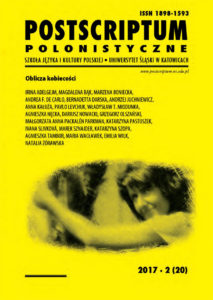Number 2017 • 2 (20)
 |
Number 2017 • 2 (20)Faces of womanhoodNumber editor: Agnieszka Nęcka |
|
List of authors
Papers:
- Szopa Katarzyna:‘Non-existent birth’. Cixous i Irigaray – women from the Black Continent
- Kałuża Anna: Equality of empowerment and gender difference. How poetry can help to overcome inferiority
- Darska Bernadetta: Can a popular women’s novel be socially committed? A few remarks on themes, genres and stereotypes
- Packalén Parkman Małgorzata Anna: Motherhood without icing and retouching. The ‘Polish Mother’ icon in Polish literature created
after the year 2000 and blogs - Nowacki Dariusz: Cathy, the Caryatid does not live here any more. Unwanted pregnancy and abortion in new women’s prose
- Adelgejm Irina: ‘I want to talk’. The psychotherapeutic functions of Justyna Bargielska and Anna Starobiniec’s narrations on perinatal loss
- De Carlo Andrea F.: Ecce femina – in a search of the source of feminity (on menstrual blood in Polish contemporary literature based on selected examples – Izabela Filipiak and Olga Tokarczuk)
- Slivková Ivana: The beauty myth and The Ugliest Woman of World [Najbrzydsza kobieta świata] by Olga Tokarczuk
- Żórawska Natalia: ‘Memory does not forgive’. On White Rika [Biała Rika] by Magdalena Pary
- Boniecka Marzena: Women’s death writing. On Aniela Gruszecka’s creativity
- Olszański Grzegorz: ‘I come back to the place that does not exist’. On different forms of experiencing an atopy
- Tambor Agnieszka: Women’s death writing. On Aniela Gruszecka’s creativity
Varia:
- Wacławek Maria: A study of the profiles of female partners and modification of the traditional model of the stereotypical girlfriend
- Pastuszek Katarzyna: Landscapes. Topography in the selected late works by Eliza Orzeszkow
- Sznajder Marek: Looking for a paradigm – problems with the limits of research and methods of objectivization. Prolegomena of experimental literary criticism
- Bąk Magdalena: More, fully, intense. Emigration according to Tomasz Łychowski
Reviews:
- Juchniewicz Andrzej: In the snot of emotions and conventions. Review of Beata Przymuszała’s book: Smugi Zagłady. Emocjonalne i konwencjonalne aspekty tekstówofiar i ich dzieci
- Nęcka Agnieszka: Tracing a ‘subtle presence’ of Julia Hartwig. Review of Elżbieta Dutka’s book: Centra, prowincje, zaułki. Twórczość Julii Hartwig jako auto/bio/geo/grafi
- Wilk Emilia: ‘Evil, which pretends to be good’. Review of Bernadetta Darska’s book: Maski zła. (Nie)etyczność postaw i zachowań
- Miodunka Władysław T., Levchuk Pavlo: Ten years of Polonistic Studies at the University in Lviv. Review of the book: Język polski i polonistyka w Europie Wschodniej: przeszłość i współczesność




